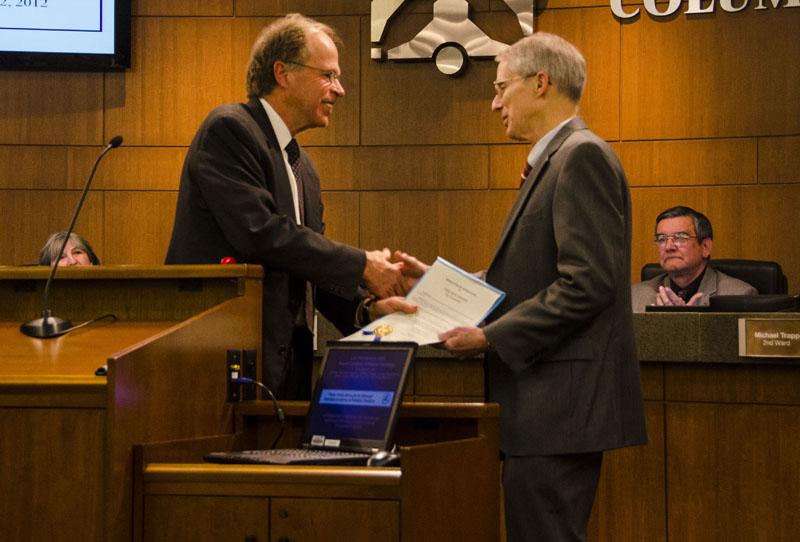Several residents urged City Council on Monday night to expand, reroute and improve public transportation.
Expanding public transit in Columbia could have beneficial effects for the community, according a December 2012 Health Impact Assessment.
“Those who use public transit accrue more physical activity throughout the day by walking or biking to and from bus stops,” stated a health impact assessment on expanding public transit in Columbia. “Therefore, expanding bus services while concurrently improving infrastructure that allows for active transportation has potential positive impacts for local health.”
But Columbia Transit experienced a deficit of $1.70 per revenue mile in fiscal year 2011.
By improving the system, transit would reach more residents, Columbia resident Carmen Williams said.
Some benefits of an improved transit system include increased accessibility to health care, employment, education and healthy food options. Also, improved public transit would promote a more livable and sustainable community, according to the assessment.
The assessment found no evidence suggesting that expanding transit would negatively impact community health.
In addition to students, workers need transit to get to and from jobs, Williams said.
Low-income and physically impaired residents would especially benefit from improved public transit, Williams said.
“It’s like a cycle — a catch-22,” Williams said. “There are people who can’t get a job, and because of that they can’t get a car, so they can’t get to a job because they can’t have a car.”
Low-income families who could rely on public transit face limitations with underserved areas in the city and 40-minute gaps in between buses, Central Missouri Community Action member Sarah Klaassen said.
With the improved transportation, low-income residents will have the ability to purchase healthier food options.
“There are people who purchase their food at Walgreens simply because it is in walking distance,” Williams said. “That doesn’t provide them with many healthy food options. All these things are factors in how our community functions.”
Williams met with various Columbia residents and found that most were open to increased fares for increased services, Williams said.
The council should allocate a larger portion of the transportation sales tax to transit and bring in a consultant to improve efficiency, Klaassen said.
“We have a lot of people ready to ride a focused and efficient system,” Klaassen said. “(Improving the system) will improve mobility and in turn, improve a lot of lives.”
Sixth Ward councilwoman Barbara Hoppe also expressed a desire at the meeting to hire a consultant to find ways to make the system more efficient.
“(We need to look at) all the people in Columbia that would like to use transit but right now, our present system, in the routes and the timing, isn’t something that they can use,” Hoppe said. “(We need a consultant) really looking at the nuts and bolts of Columbia and how it operates. You have to have something that serves the people well to market.”
Improved public transit is essential for the city to keep up with rapidly expanding city population and development, Williams said.
“I believe that there are people that would ride more often if there was more availability, increased frequency and expanded routes,” Williams said.
One of the many challenges the city faces in tackling transit is that students tend to prefer to use their cars more than buses, Mayor Bob McDavid said.
A report for increasing ridership found that 47 percent of students surveyed have not ridden the bus in the last 12 months.
“The second thing is culture,” McDavid said. “It’s a culture where students like to drive their cars — The University of Missouri has an economic model which favors commuter students. It’s a legacy model, it goes back a long time.”
The city needs to start marketing to students who plan to live in new residential areas, such as Aspen Heights and The Domain, McDavid said.
Despite the deficit, public transit results have improved, City Manager Mike Matthes said.
“It is getting better,” Matthes said. “All of the things we saw two years ago is better. It’s not healthy by a long stretch either. There is a lot more ridership than there was the first month. We hired a marketing expert — that’s a big step forward. I feel hopeful for the future. It won’t happen overnight and we do need to come up with a strategy.”








